 For the fourth year, Stop the Cap! is pleased to bring you our advice on how to win yourself a better deal from Time Warner Cable. If you are paying regular price for Time Warner Cable service, you are throwing money away. There is no award for being a loyal cable customer these days. Only new customers and those willing to demand a better price get the best deals, while everyone else pays astoundingly high rates.
For the fourth year, Stop the Cap! is pleased to bring you our advice on how to win yourself a better deal from Time Warner Cable. If you are paying regular price for Time Warner Cable service, you are throwing money away. There is no award for being a loyal cable customer these days. Only new customers and those willing to demand a better price get the best deals, while everyone else pays astoundingly high rates.
We are rarely surprised by anything, but even we confess astonishment as customers continue to show us their $180-250 cable bills. Most have been customers for decades and have never bothered to ask Time Warner if they could be getting a better deal. They should have asked us because the answer is absolutely yes. If you can devote about one hour a year and are willing to do some homework, even those coming off a promotion can save hundreds of dollars a year and get better service.
For those accustomed to badgering the cable company for a better deal year after year, we have some troubling news. Time Warner Cable is making things harder for you. In years past, customers only needed to use social media like Twitter or Facebook and ask for a better price and the cable company usually called back with a great promotional offer for the next year. Those days ended last fall, when the company began channeling current customer promotions almost exclusively through its national customer retention call centers. Even the oldest method of all — showing up at a local cable store with boxes in tow ready to turn in as you threaten to cancel service over its cost today often results in a shrug of the shoulders and an admission cable store employees are increasingly unable to offer customers promotions to entice them to stay. We saw this ourselves this week. As a result, Time Warner Cable lost that customer on the spot.
So why do cable companies play this game with their customers year after year? In a word, it’s all about the money. At least 80% of Time Warner Cable customers are still paying the company $10 a month to rent a cable modem customers can buy for themselves for as little as $50. Why do they keep paying? Because it’s a hassle or the customer believes they are incapable of installing their own. Even those who fought and won up to $1,100 in savings last year procrastinate after that promotion expires and put off trying to renew it. Why? Because few people relish debating for discounts. It’s a chore. But you say the same thing about doing your taxes, so it’s time to get some discipline and get this done. We’re even going to walk you through the process and share the tricks and traps you are likely to encounter along the way and how to get past them. How do we know? We have Time Warner Cable service too.
Heads Up: Time Warner Cable & Charter Communications — You may have read that Charter Communications is in the process of acquiring Time Warner Cable. Most state regulators with the exception of California (where approval isn’t a done deal at the time of writing) have approved the sale and federal regulators seem likely to follow, with a number of conditions Charter will have to meet going forward. For the rest of 2016, even if the deal is approved, we don’t expect many immediate changes. You are likely to see the Time Warner Cable name, packages, and pricing remain the same for most of this year. Next year, we expect Charter will want to retire Time Warner’s name and packages and move customers to their Spectrum product suite, at new customer pricing for all for the first year. We will update readers as needed to explain the transition, but it should not affect any promotions you win for at least the next year.
Getting Ready to Deal
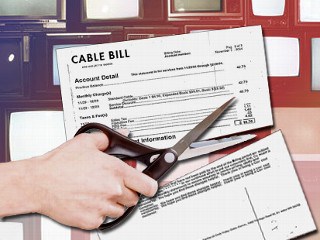
Time to cut the cable TV bill down to size.
Based on reader input and our own experiences, you are going to find Time Warner Cable less willing to volunteer their lowest price promotions as they have in the past. Customer retention call center workers are trained to try to keep your business without giving away too much to customers threatening to leave. That is why doing your homework is essential before you call.
The most common reasons people call threatening to cancel service are:
- a poor service experience
- a rate increase or the end of a promotion that results in a higher rate
- a better deal from the competition
When you call to cancel service, a representative will seek to understand your reasons and attempt to save you as a customer. If you respond you don’t like the picture quality or your Internet is constantly going out, you are unlikely to get a promotion. You’ll be offered a one-time service credit and a repair visit. If you are calling to cancel over a rate hike notice, they will probably offer a tepid promotion that effectively wipes out the rate increase, but still leaves you paying a lot more than you should. The best offers are designed in response to marketing from competitors trying to steal you away as a customer.
Doing Your Homework

This year’s key word is: UPGRADED. Your local phone company just notified your neighborhood better service and a better deal is now available.
We believe the best deals will go to customers prepared to bring a competitor’s offer for them to match. If Time Warner’s local competitors are Google Fiber or Verizon FiOS, you are probably going to get a great deal without a lot of effort. In the northeast, Verizon FiOS and Time Warner Cable have had to face the fact if a customer of either doesn’t get an excellent deal to stay, they are going to switch to the other for one or two years and then switch back after the promotion expires. We’ve seen retention offers in these areas that even include high value gift card rebate offers normally reserved exclusively for customers able to prove (with their final bill) they are leaving one provider for the other. In areas where Time Warner Cable competes with AT&T U-verse, negotiations can get tougher. Time Warner Cable retention operators will listen to your claim you can get a better deal from AT&T or DirecTV and then try to trip you up by asking a lot of questions about 1-2 year contracts, HD fees, set-top equipment fees, broadband speeds, and other sneaky fees AT&T loves to slap on their bills but not always disclose in their advertising.
Things can get even tougher if their only significant competitor is Frontier Communications, HawTel, Windstream, CenturyLink, or other independent telephone companies. Most customers still can’t get TV service except through a companion offer with a satellite company and broadband typically comes in the form of underwhelming DSL. Time Warner Cable has a database of their competitors’ promotions and packages, and they respond to your price match request by trying to find the offer you want them to match in their system. When they find it (or something close to it), the call center operator will respond with a series of challenging statements to cut the apparent value of that promotion. For example, they will claim the competing offer does not include certain features Time Warner includes at no extra charge or doesn’t include various equipment, programming and other hidden fees that raise the price.
If you concede this, the price they will ultimately match is likely to be higher than what you originally thought. It may even sound reasonable to you, because you are used to “gotcha” and hidden fees that are already on your current Time Warner bill (fees the retention operator usually “forgets” to mention Time Warner also charges when they claim to be making an “apple to apple” comparison of the two offers.) That’s their game and it is designed to confuse and overwhelm you. We are going to teach you how to avoid getting on board their carnival carousel.
The key word for 2016 is: UPGRADED, as in their competitor ‘just notified you they have upgraded your neighborhood to a better level of service with a great limited time, local promotion just for customers like you.’
As AT&T and other phone companies continue to upgrade their networks to deliver video, phone and better broadband service, you can shut down the debate about DSL broadband speed and the many deficiencies of telephone company partnerships with satellite TV providers. Instead, you will explain the phone company can now match the speed Time Warner is selling (or at least the speed you need), and with services like Frontier FiOS TV/Vantage TV, CenturyLink’s Prism, Hawtel’s TV, and Windstream’s Kinetic TV, you don’t need a satellite dish to watch anymore.

A Time Warner Cable call center.
But before we begin negotiations, a review of what you are already paying for is in order. Go and grab your latest Time Warner Cable bill.
If you are a broadband-only customer, you’ve probably received many offers to add television service. Those with cable television and broadband may be getting cards in the mail offering to add phone service for an additional $10 a month. Those customers identified as likely premium movie channel subscribers are getting offers to add multiple premiums at a special price. This practice is known as upselling, and it is how your $150 cable bill quickly rose to well over $200 once those limited-time promotions end and regular prices begin.
Here are some common cable TV add-ons that may be still lurking on your bill, are optional and may be removed on request:
- Variety Pass (a/k/a Preferred TV): Just over 60 channels of lesser-known and slightly more expensive cable networks and their cousins. Includes MTV, Aspire, Cooking Channel, FOX Sports, Crime and Investigation Channel, GSN, LOGO, and National Geographic, among dozens of others. This package is very common and can often be downgraded to a 70+ Standard TV package.
- HD Pass: Usually 4-6 channels of uniquely expensive basic cable networks. Most customers probably added this during the days of HDNet — a network Time Warner Cable dropped several years ago. Today, you are probably paying $3-5 a month extra for networks like beIN SPORTS, MGM HD, RFD HD, and Smithsonian. If these don’t interest you, drop this add-on.
- TWC Sports Pass: More than two dozen additional sports channels that come at a hefty price. If you need to get your cable TV bill down, this is a good place to start.
- TWC Movie Pass: Once affordable, this package of Disney Family Movies On Demand, TWC Movie Pass On Demand, and at least eight Encore movie channels has seen steady rate increases, especially over the last three years. It may no longer be worth it.
- Various Premium Channels: HBO alone now costs $16.99 a month. Other premiums have also seen prices rise these last few years. But for $20-30 more, depending on the promotion, you can have every premium channel for a year, usually including HBO, Cinemax, Showtime, The Movie Channel, Epix, and Starz. Don’t leave your money on their table.

The TWC Digital Adapter was supposed to cost $0.99 a month. It’s now $3.25.
With the latest round of rate hikes, renting equipment from Time Warner has gotten more expensive than ever. Do you still need a traditional set-top box in the guest bedroom or kids’ rooms if they are not even interested in cable TV? Each box and remote can add up to $7-9 a month depending on your package. DVR service is also increasingly costly because Time Warner charges customers for both the equipment and the service. An enhanced DVR capable of recording up to six shows at once is a nice addition, but it can easily add over $20 a month to your bill in equipment and service fees. If you find you aren’t using the DVR as often as you used to, it may be time to switch back to a traditional set-top box, which costs much less.
If you have TVs in spare bedrooms or the kitchen hooked up with Time Warner’s Digital Adapters, you will find the price for those has also increased dramatically. Initially promised for $0.99 a month, they now cost $3.25 each. This year, we recommend returning them and buying one or more Roku 2 2015 Edition ($70) units instead, which can deliver cable TV to your spare TV sets over your home Wi-Fi. (Also available on: Roku 3, All Roku 2 Models, Roku LT, Roku HD (2500X), the Roku Streaming Stick, Kindle Fire HD & HDX, Samsung Smart TV, Xbox 360 and Xbox One.) Time Warner provides their lineup on these devices with a free app. A one time equipment purchase will pay for itself in a few years, give instant access to Hulu, Netflix, and other services and offer a less frustrating experience.
Cable modems are another piece of equipment you should not be renting from Time Warner. These devices work with your Internet service and now cost $10 a month. The top recommended Arris (formerly Motorola) SB-6141 can be purchased on eBay for around $50 (for refurbished units) and from retail outlets for $70-80 (new). If you are still renting a modem from Time Warner, go and buy one today.
Am I Getting a Good Deal?
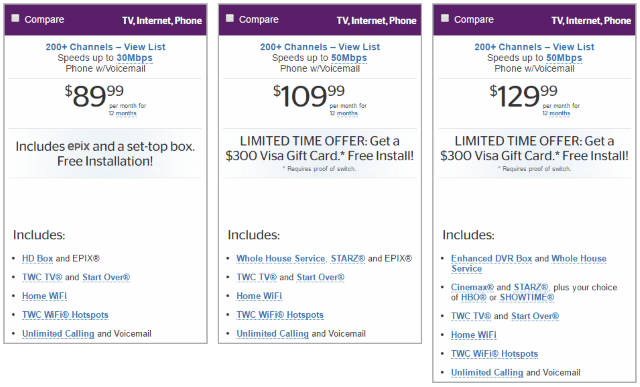
While tempting, these typical Time Warner Cable offers usually require upgrades that raise the price. For example, Whole House DVR mandatory service and equipment fees add $11.75 a month per cable box, with a two-box minimum. That gift card offer is only good if you are able to prove you are switching from another provider and can produce a copy of your final bill.
This is the part people dread the most — having to haggle over their cable bill. How do you know if the offer Time Warner gives you is a good one? The answer is: by comparing it against the competition and what Time Warner would charge new customers for the same services. If it is within that range, you’ve done okay. If you keep pushing far beyond that, you are likely to find diminishing returns and increasing aggravation – sometimes an offer promised on the phone never even makes it to your bill, because it was offered in error. Then it becomes a dispute over crediting the difference between an offer promised and one actually received. We also don’t recommend people push for rebate cards, because even if you are offered one to keep your business, you usually will not qualify for it because you typically cannot meet the rebate’s terms and conditions, resulting in a rejection letter several months later from the third-party rebate processor.
To find out pricing of current promotions, start by visiting the phone company’s website to see what it has to offer. After that, it is off to Time Warner Cable’s website, pretending to be a new customer and creating a package similar or identical to what you receive today.
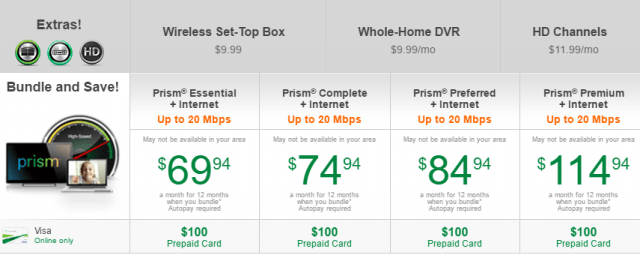
PrismTV + Internet, from CenturyLink. This service is being introduced in a number of CenturyLink-served communities.
Along the way, take note of fine print disclosures about contract terms, equipment fees, surcharges, etc. Some new customer offers increase in price during the second year, but ignore that. You are only negotiating for a better price for one year. In general terms, you are probably going to find new customer prices averaging in this range:
- Broadband only: $34.95/mo for 12 months (Standard service)
- Triple Play (broadband, TV + Enhanced DVR, phone): $99.99/mo for 12 months (30Mbps service)
- Double Play (broadband + TV): Expect to pay around $80-90 for Standard/Turbo/Extreme broadband with traditional 200+ channel Preferred TV (periodic promotions offer enhanced speed broadband at the higher side of this price range)
Be aware most promotions start with lowball offers that do not include equipment like the very popular and expensive DVR (with the equipment and service fee), and the additional cost of a second set-top box many people have in their master bedroom. There are also Broadcast TV and Sports Programming surcharges increasingly charged by providers, and the usual taxes and fees.

No, dealing with Time Warner Cable won’t reduce you to tears.
If you want to save time and are comfortable with a triple play package including 200+ channel Preferred TV with DVR and one additional standard HD set-top box, Ultimate Internet (50Mbps or 300Mbps in Maxx-upgraded areas), and Unlimited local/nationwide home phone service with voicemail, you should be able to easily negotiate a price hovering around $120-130 a month. We pay closer to the high side of that range after subscribing to “whole house” DVR service, which allows you to watch shows recorded on a DVR in another room. That price represents about a $50/month savings over the $175 price we would pay with the lesser promotion they offered us after the most recent one expired. If you are in a more competitive market with an even better deal than we found from our local providers, Time Warner should be able to match it too.
It’s Time to Make the Cancel Call
We’re getting close to making that phone call. Just one more reminder: the retention operator will probably try to question your competitor’s deal. That is where our magic word UPGRADED comes in. You are going to stay resolute the competitor’s offer you negotiated and are telling Time Warner about specifically targeted those gotcha fees and hidden charges, which have all been waived or do not apply. To win your business after the upgrade, the price quoted is the “out the door” price exactly as it will be billed to you, without hidden fees, no term contracts, and no gotchas. You can acknowledge those fees are common among many providers, but they do not apply to you in this case.
Get a glass of water, a pen and paper, and be prepared to spend about 30 minutes total on the phone (most of that will be on hold as they change your account to add the promotion you just won).
Call 1-800-892-4357 and say “cancel service” when the automated system asks what you are calling about. From there, your call will be forwarded to a customer retention call center. The first thing you should ask when connected is the representative’s name and extension (or other identifying information). If your deal isn’t applied (or applied correctly) to your account, the name of the person you spoke with will go a long way to getting any problems straightened out.
 You will be asked why you are canceling service. You want to emphasize “it costs too much” and you have “found a better deal” elsewhere. You should expect the representative to start negotiations by attempting to downgrade your current service to save money. Do not play this game at this point in the call. Politely tell the representative you are not interested in a reduction in your services because you can get the same or better from the competition… at a lower price. Keep reminding them your concern is over the cost of the service, nothing else. Don’t get sidetracked talking about service problems or poor customer service. Address those issues at the end of the call.
You will be asked why you are canceling service. You want to emphasize “it costs too much” and you have “found a better deal” elsewhere. You should expect the representative to start negotiations by attempting to downgrade your current service to save money. Do not play this game at this point in the call. Politely tell the representative you are not interested in a reduction in your services because you can get the same or better from the competition… at a lower price. Keep reminding them your concern is over the cost of the service, nothing else. Don’t get sidetracked talking about service problems or poor customer service. Address those issues at the end of the call.

Despite assertions Time Warner Cable customers won’t endure extended hold times, at least 2/3rds of our recent calls were spent listening to hold music.
You will be asked to describe the deal from the competitor. Let them know that with recent upgrades in your area it covers all the TV channels you want to watch, has the same broadband speed you are getting now, and offers unlimited local and long distance calling to all the places you care about. Let them know you have already talked to the other company but after a family discussion, you decided to give Time Warner a chance to match or beat their offer and will stay as a customer if they can.
The retention operator will likely try to challenge the competitor’s offer, but each time politely remind them your offer either includes those fees/charges or waives them with no contract obligation and no cancellation penalties. Tell them that competitor is going all out to sign up new customers in your neighborhood.
At all times, be polite, persistent, and persuasive. If you are pleasant, representatives will often go the extra mile for you. Try saying, “is there anything else you can try to get me a better price,” “I really appreciate all of your help today,” and “thank you for looking into this for me.” If things seem to be going against you, remind them, “I know there must be something we can do together to get to a better deal,” “I know you might not be able to do this for me, but perhaps a supervisor could?” and “maybe I am approaching this wrong and we need to start over and try to find the best promotion we can, even if it means adding or changing something that will get me a better deal.”
At this point, the operator will put you on hold and review the promotional offers they can apply to your account. When they return to the line, hear them out but you need them to come within $5-10 of the deal you took to them. If they can’t, you can usually ask if a supervisor will grant you a one time service credit for the difference between the two prices, or to give you a free upgrade to faster Internet speed, a premium movie channel, or something else to sweeten the offer. Try to stay flexible over a few dollars either way. The representative cannot make up a deal, they have to find one in the system that matches your current services and enter the proper code(s) to apply it to your account. Write everything down and repeat it back as you go to make sure you both understand the terms. Also make certain to ask if ANY other fees or charges apply, and if they do, write them down. In most cases, the price you get will be before taxes and some surcharges.
If you find you are dealing with a difficult or intransigent representative, thank them for their time, hang up and call back in a few hours and try again. You never have to commit to a deal immediately. If you want to think about it, ask for the representative to note your account with the offer he or she made and ask their name so you can refer back to that conversation when you call back.
Save your notes. It is unfortunately all too common that the deal you were promised over the phone can look very different on your first bill. But if you kept your notes and the name(s) of representatives you spoke with, any problems can be fixed later with a corrected deal or service credits.
[flv]http://www.phillipdampier.com/video/Inside Amy Schumer – Calling the Cable Company.mp4[/flv]
Amy Schumer calls Time Warner Cable. It wasn’t this bad for us, we swear! (4:45)


 Subscribe
Subscribe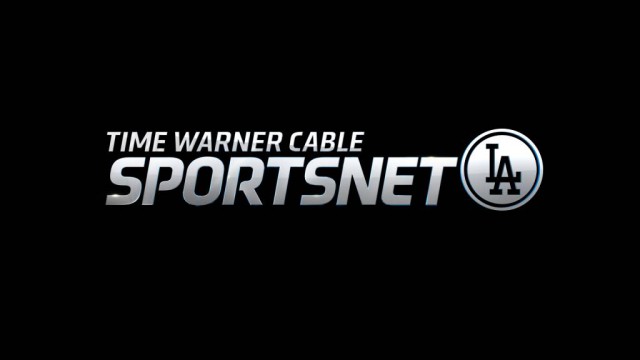 A bone toss by Time Warner Cable (just over a week before the opening of baseball season) to get Southern California satellite and cable providers to pick up carriage of the Los Angeles Dodgers’ SportsNet LA at a discount has backfired and further inflamed critics of the cost of sports programming.
A bone toss by Time Warner Cable (just over a week before the opening of baseball season) to get Southern California satellite and cable providers to pick up carriage of the Los Angeles Dodgers’ SportsNet LA at a discount has backfired and further inflamed critics of the cost of sports programming. The issue has sparked outrage among sports fans and politicians, who have complained about the ongoing impasse between Time Warner and other providers. Only Charter Communications, now in sensitive negotiations with the California Public Utilities Commission over its acquisition of Time Warner Cable, relented and agreed to pick up the channel for its customers last summer.
The issue has sparked outrage among sports fans and politicians, who have complained about the ongoing impasse between Time Warner and other providers. Only Charter Communications, now in sensitive negotiations with the California Public Utilities Commission over its acquisition of Time Warner Cable, relented and agreed to pick up the channel for its customers last summer. “Why would anyone give everyone a taste of something for a year?” Mark Ramsey, a media consultant based in San Diego,
“Why would anyone give everyone a taste of something for a year?” Mark Ramsey, a media consultant based in San Diego, 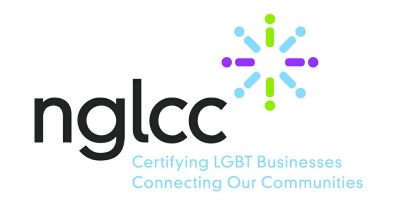 Time Warner Cable has a new friend from the “diversity” community.
Time Warner Cable has a new friend from the “diversity” community. On Monday, Stop the Cap! joined 21 other public interest organizations in
On Monday, Stop the Cap! joined 21 other public interest organizations in  Syracuse residents will be the first in upstate New York to benefit from Time Warner Cable’s Maxx upgrade program, which has been gradually moving across the cable company’s footprint.
Syracuse residents will be the first in upstate New York to benefit from Time Warner Cable’s Maxx upgrade program, which has been gradually moving across the cable company’s footprint. Broadband speeds will increase starting later this spring, with customers experiencing increases up to six times faster, depending on their current level of Internet service. For example, customers who subscribe to Standard, formerly up to 15Mbps, will receive up to 50Mbps; customers who subscribe to Extreme, formerly up to 30Mbps, will receive up to 200Mbps; and customers who subscribe to Ultimate, formerly up to 50Mbps, will receive up to 300Mbps, with no change in their monthly plan price.
Broadband speeds will increase starting later this spring, with customers experiencing increases up to six times faster, depending on their current level of Internet service. For example, customers who subscribe to Standard, formerly up to 15Mbps, will receive up to 50Mbps; customers who subscribe to Extreme, formerly up to 30Mbps, will receive up to 200Mbps; and customers who subscribe to Ultimate, formerly up to 50Mbps, will receive up to 300Mbps, with no change in their monthly plan price. “Our customers have asked for faster Internet speeds and we’re now able to provide these faster speeds at no additional cost to all of our customers in the Wilmington area,” said Darrel Hegar, regional vice president of operations for Time Warner Cable. “This is just the beginning of the benefits customers will see from our TWC Maxx initiative that will enhance our Internet, video and reliability.”
“Our customers have asked for faster Internet speeds and we’re now able to provide these faster speeds at no additional cost to all of our customers in the Wilmington area,” said Darrel Hegar, regional vice president of operations for Time Warner Cable. “This is just the beginning of the benefits customers will see from our TWC Maxx initiative that will enhance our Internet, video and reliability.”